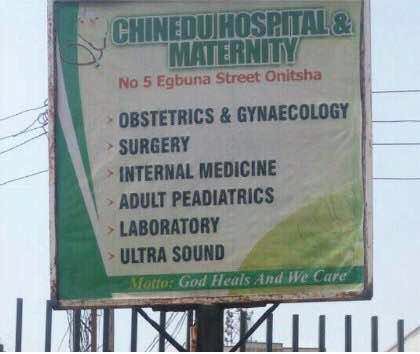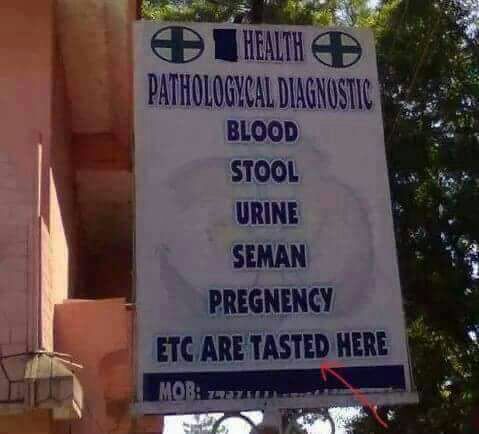Fake Health Care Centres - Short Cuts to Medical Treatments Now Getting Ridiculous
- Mar 25, 2017
- 4 min read
Whatever your feelings about an average Nigerian, you are hardly likely to question their industriousness or enterprise; and their determination to survive.
In many places outside home, Nigerians are recognised for stellar achievements that seem to belie the challenging mix of contradictions that exist in the Nigerian state which has so much potential for brilliant developments.
Today, I turn my attention to certain places of ‘health care provision’ in Nigeria whose very existence and persistence despite a growing population with access to improving social media connections with other parts of the world inspire frustration and ridicule in equal measure.
No doubt, the provision of healthcare can be good business.
If you live in any of the busy cities of Nigeria, then of course you will be familiar with these places that do not officially meet the definition of a health facility but do their best to draw clients with strong promises of effective treatments of a variety of medical disorders. As people will always have one form of complaint or the other, there is a steady demand for a set of payable services - hey presto! – business success.
It has now become popular in social media to share images of the signboards and notices of these ‘shops’. To people of medical background, they are very amusing in the way they combine the ability to cure vastly different medical conditions; as well as the language used. This is because some of the terms are adulterations of real medical terminology, which therefore calls to question whether those who produce these signs and run these ‘’shops’ ever attended any Medical Laboratory, Nursing or Medical school.
Take a few examples in our gallery here:
The most common issues are with misspellings of basic medical terms such as:
Semen misspelt ‘seman’ for example; or Fasting, misspelt ‘fasten’ and Pregnancy misspelt ‘Pregnency’ in images 1 & 2
Root and Harb (maybe they meant Herb?) in image 3 doesn’t induce too much confidence in me when they advertise the ability to cure.
Others include:
‘Goloria’ for Gonorrhoea
‘Taiford’ for Typhoid
‘Civilis’ for Syphilis
‘Orsa’ for Ulcer
‘Diabitis’ for Diabetes
‘Fabros’ for Fibroids.
Help!!
Seriously – is it a joke? Maybe if you are brave enough to walk through the doors you are greeted with smiles and laughter and reassured – it’s a just a joke to get clients in – but No!
Really, the person who puts up these posts and boards wants the unsuspecting health care user to come in and place him or herself at their mercy believing they have the power to help them and cure their ailments.
Please don’t give me the argument that in Nigeria we speak multiple languages and English is not our first language.
To those who say – ‘it’s just words, it doesn’t matter’ I say: Yes. It. Does!
These boards/posts speak to carelessness in attention to detail and frivolous claims – is that how you want to be cared for?; or your relative and friends?
And if you think it escapes you then maybe your driver or house-help in a lower social stratum frequents these places, and you know, their lives also matter!
But more broadly, this speaks to negligence on matters of public safety and threats to public health in Nigeria. Poor health care provision is perhaps most consequential.
Improving health care provision in Nigeria is an issue for multiagency collaboration at federal, state and local levels.
There is a need for political leaders to recognise that investing their political will and capital to drive the right policy supports with the appropriate regulation as well as resources in the health of Nigeria IS the most important investment of all.
It has potential positive, social, economic, and political multiplier effects and impacts that will lead to a fairer, just, equitable and greater Nigeria.
Quality universal health coverage that ensures access and affordability at the point of need is the unique safety-net that all Nigerians desire and deserve.
So, in interrogating the activities of ‘quacks’ running all kinds of ‘shops’ at every corner or turn in rural and urban neighbourhoods, offering false hopes and exploiting vulnerable Nigerians and victims of our weak health systems, the following questions are pertinent:
What are the qualifications of the owners of such establishments that permit them to offer the services they claim expertise in?
What are the tales told by those who use the service?
When things go wrong, what happens?
Perhaps governments at federal, state and local levels need to work collaboratively to agree on standardising and regularly accrediting health facilities and providers in Nigeria to improve quality and access to systematically eliminate quackery in health care delivery in Nigeria.
Finally – if you know someone who has used one of these places - good or bad experience and health outcome; I’d love to hear you share the experience in the comments section below!
Till then, Stay Well!
Editing by AskAwayHealth Team
Disclaimer
All AskAwayHealth articles are written by practising Medical Practitioners on a wide range of health care issues and conditions to provide evidence based guidance and to help promote quality health care. The advice in our material is not meant to replace management of your specific condition by a qualified health care practitioner.
To discuss any medical condition, please contact a health practitioner or reach us directly through info@askawayhealth.org




















































Comments